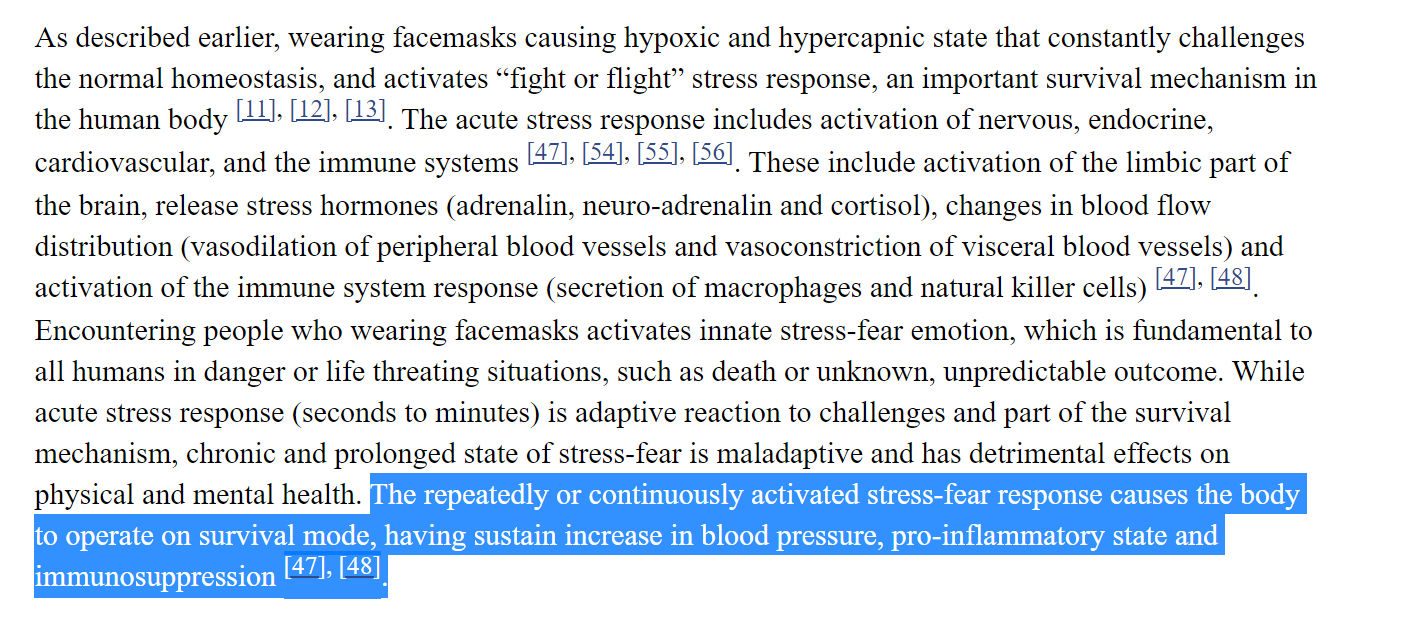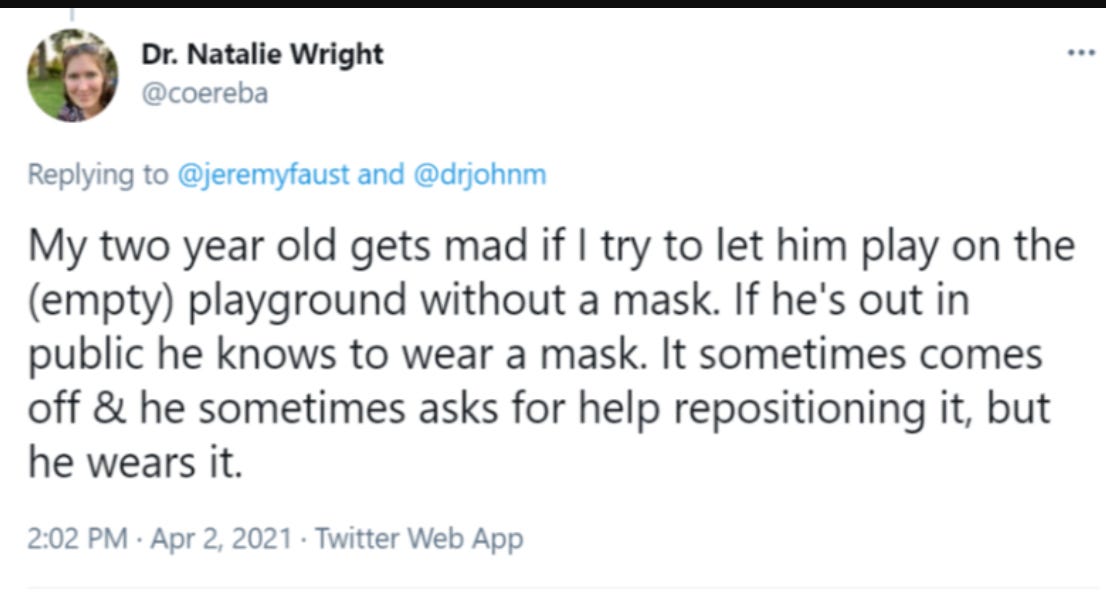the efficacy of masks has been much discussed and debated as they went from “not recommended or effective vs respiratory viruses” in early 2020 and in prior years to a “must have social mandate” as covid has worn on. did this ever make any sense or was it just a path of least resistance to adopt a highly visible talismanic placebo to look like experts and leaders were “doing something” about covid?
at the end of the day, any medical or epidemiological mediation or intervention comes down to a cost benefit analysis. what is the benefit of adoption and what is the price paid to do so? so much time has been spent fighting about efficacy of masks that the cost side of this equation has received somewhat short shrift. my goal here is to set effectiveness aside as an issue for a moment and take a look just at cost because i think this side of the story needs a better hearing and provides a far higher hurdle rate for “worth it” than is being admitted in public debate and policy.
many have tried to argue that masks must be worthwhile because their cost to adopt is so low that even modest benefit must outweigh it. was this claim ever true or was it just convenient tactical propaganda used to prevent taking a real look at the policy? this piece in med hypotheses from NCBI/NIH argues that the costs are far more significant that many are making out. LINK TO STUDY
let’s look:
even a cursory look at this set of adverse effects shows that these are far from non-existent or benign. masks have serious costs to health and to mental well being and those two effects are not independent variables. as anyone who has tried dealing with masks in public can attest, masks are isolating and alienating. they block facial expressions and thereby eliminate a major vector of human communication. you cannot smile at a cashier. they cannot smile back. there is a reason masks are used to dehumanize people in torture, brainwashing, interrogation, and sadomasochism. erasing a human’s face is not a trivial matter and pooh-poohing it like it is is not a helpful instinct. the stress many feel from mask wear is very real, and worse, it’s immunosuppressive. that is not a feature one looks for in a disease prevention modality.
the alienation of masking, particularly in combination with the isolation of lockdowns poses a double-whammy threat that has severe mortality implications. if one is being honest, the issue is not whether, ceteris paribus, lockdowns and masking added to mortality but rather by how much they did so. the effects of such disruptions of social and societal are profound. grandma really can die of loneliness in the hospital because you cannot visit her. isolation is hell on humans. there is a reason it’s a fear punishment, even in prison. this is the bogey against which we must attempt to balance any purported efficacy.
worse, there are long term effects from masks driven by both psychological and physiological issues. this raises the horrifying question of whether the is really such a thing as “long covid,” a proposition that looks tenuous to any extent surpassing the ability of any disease inflict long term harm (the flu causes permanent neurological damage in people every year) or whether and to what extent this is actually “long mask.” i think it’s fair to say that the evidence on long-term mask wear looks compelling as a source of durable (or permanent) damage. the article is well footnoted with studies in this regard. i’d recommend reading some. this is not the benign “no big deal” that many are making it out to be. the costs are very real and far greater than proponents seem to suppose (or are willing to let on).
those in fear adopt and push masks because they find them to be a useful psychological crutch. even as early as may of last year, the new england journal of medicine was publishing warnings about this issue. NEJM LINK
but then they really veered into getting it wrong. despite coming out and directly saying that doctors were too busy panicking to listen to sense or data, they then go on to speak of masks maybe working on covid but likely being a big help in terms of mitigating anxiety. this is, of course, 100% wrong. masks exacerbate anxiety. bigly.
and the effects of this have been downright cruel on many, including and especially children. this idea that “my kid loves his mask” is misguided conditioning getting used to signal virtue rather than admit the relentless terror people have used to program their kids into submission.
it’s just the LITTLE ALBERT experiment on a societal scale. in this infamous study, researchers took a 9 month old and conditioned him to be terrified of rats to which he had previously shown interest and curiosity. this not only worked, but poor albert also became afraid of other animals as well despite never having even seen them before. this was a nastily unethical study and no one would even think of repeating it today. well, or no one had thought to until covid.
imagine mistaking this for a good thing. this is not a child “liking his mask” this is a child scared out of his wits and clutching at a purported safety blanket and completely misevaluating a safe situation because of how much fear has been ingrained. one could easily condition a child to do all manner of anti-social things and to bond to harmful practices. the fact that it CAN be done and that it works is hardly evidence that it SHOULD be done.
but this is the nature of talismans. the whole process is non-rational and the attachment to them becomes increasingly severe the longer one uses one. this is simple human behaviorism. if you persist in doing something unpleasant, your mind generates cognitive dissonance if you cannot tell yourself a story about why you are doing it that satisfies you. your brain is incredibly inventive and potent in this regard. being paid to perform an unpleasant task makes you like the task less than if you do it for free because you can tell the “well, i got paid” story. if you cannot, your brain literally tells itself “this was not so bad” so that you don’t feel stupid for having done it.
this process of cognitive dissonance and resolution means that the actual act of wearing a mask makes you all the more determined that masks work and that masks are a social responsibility because those are the internal narratives that support your choice. of course, the converse is true as well and not wearing a mask will likewise make you hate them more and become less convinced they do anything. this is probably why this issue has, after 9 months of conditioning and virtue signaling, turned into such a flashpoint with two camps that are both absolutely convinced that the other are fools and reprobates and will not hear a word to the contrary. this is problematic as it means the data is not really getting looked at. and it needs to be. this is epidemiology and societal well being, not a partisan poo flinging contest or some endless treadmill of counterproductive hectoring. so let’s use data.
looked at dispassionately, the cost on masking is really quite high. this is not some trivial compromise or minor inconvenience, especially for those required to wear them long term at work. it’s time this was added to the scales in assessing the balance of harm vs benefit. the benefits of masking would need to be extremely significant to be worth such a cost. (even if we accept the right to force them upon the unwilling to be out in public, itself a deeply fraught and problematic idea) given these high costs and intrusions of liberty and mental well being, the burden of proof must fall upon those seeking to impose such mandates not upon those who would question them.
have they generated evidence of efficacy not rooted in irrelevant lab bench mechanistics and superstition that is sufficient to offset these costs?
this is a topic for another time and that i’d like to come back to later. i’ll try to get a companion piece to this on that up in the next few days.













We need to start listening to the Industrial Hygienists who actually do PPE for a living. Masks don't work against viruses. https://www.youtube.com/watch?v=I3dor-4Af2A
Dear Gato,
Something I cannot understand today which you perhaps are most qualified to educate me about. So I ask, how is it the clinical, academic and institutional doctors in the US and Europe too it seems, so utterly cowed into submission to say or not say anything to support "the narrative". Seriously, is it threats to loose licenses? Yet a very few like flccc are very vocal and remain licensed (but have lost jobs I think). Or student loan debt? Or, is weekly waterboarding part of medical school for some time now???
I wonder what hold exactly "they" have on them to render smart people, trained in nuanced thinking to destroy the hard won credibility of their profession to protect such obvious frauds. And thanks to you for pointing out many examples.